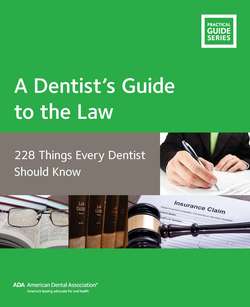Читать книгу A Dentist’s Guide to the Law - American Dental Association - Страница 90
На сайте Литреса книга снята с продажи.
45. What Steps About Site Content Can I Take to Reduce My Legal Exposure?
ОглавлениеThe specific words, graphics, and sounds on your site can make a world of difference legally. For example, do you really want to stand behind an absolute claim, such as “Whiter teeth guaranteed in 30 days”? Might a softer claim be just as effective from a marketing perspective? Words like “may, could, and might” are probably more defensible in many cases than “will, always, and shall.”
When developing your website’s content, think through what you are really trying to accomplish, and find the right words (and perhaps graphics and sound) to fit your objectives, while attempting to minimize your legal risks. Keep in mind the following:
• Be careful not to engage in the practice of dentistry online, unless that is your intent and you are properly insured
• To minimize the chances of being sued for inaccurate information, make sure your content is “solid” (accurate, truthful, and substantiated)
• Avoid using absolute claims (consider softer language where appropriate)
• Regularly update your site (e.g., take down information that is no longer accurate)
• Date the content on each page, so viewers will know what information is older and potentially less reliable (e.g., “created on …”, “last modified on …,” etc.)
• Archive your site, so you have a defense based on proof of what was actually on it if you are sued
• Maintain security, privacy, and confidentiality as appropriate
• Adhere to any applicable state and federal requirements
• Comply with copyright laws when using third party content
• Use a “Terms of Use” agreement to help protect against liability for third party content
Legal issues related to digital Internet marketing are, by and large, the same legal issues and concerns that arise when marketing in any other medium. What makes the Internet different is its ease and immediacy — a person can quickly and easily download something from the Internet and post it to their site (possibly infringing on a third party’s intellectual property), a dentist might quickly and easily (and knee-jerk emotionally) respond online to a negative review (possibly giving rise to HIPAA concerns as well as appearing insensitive forevermore to anyone seeing your response). By understanding that the same legal concerns that arise in any other marketing context are also present in the digital world, you and your practice will be better positioned to avoid legal challenges.
